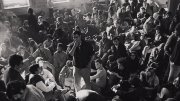In his initial public message as interim president, on January 8, Alan M. Garber wrote, “Since I first arrived here as an undergraduate in 1973, I cannot recall a period of comparable tension on our campus and across our community” (see
harvardmag.com/garber-message-24). That date is telling: for all the genuine concerns about Harvard now, the Vietnam-era crises that tore the country apart had an equally severe impact on campus, culminating in the occupation of University Hall in the spring of 1969 and physical expulsion of its deans, the violent police removal of the protestors, and the virtual shuttering of academic work thereafter (see “Echoes of 1969,” March-April 2019, page 52). Without making light of the current situation, it seems pertinent to put it in the context of that earlier crisis.
In his new memoir, A Life in the American Century (Polity), former Kennedy School dean Joseph S. Nye Jr. touches on that era. A frequent traveler between academia and government, he spent a scholarly year in Geneva before returning to the University’s Center for International Affairs (CFIA) in 1969. He writes: “Harvard was in turmoil. Three years earlier, students had blocked [Defense Secretary] Robert McNamara’s car during a visit and protested the presence of members of ROTC (Reserve Officers’ Training Corps) on campus.” After the University Hall occupation, “Numerous protests followed, including a large and destructive riot in Harvard Square.…The faculty was deeply divided and meetings on issues like ROTC and African American studies were acrimonious.”
From Nye’s office, temporarily housed in the then-Semitic Museum, he was aware as the CFIA “was occupied a number of times; an attack by a Weathermen fringe group (a faction of Students for a Democratic Society) sent a staff member to the hospital; in another attack, a bomb was exploded in an office. To quote a Weathermen pamphlet I kept from November 1969: ‘The people who run the CFIA are hired killers.…Professors who help the government are pigs. Isn’t there a pig you’d like to get?’” Protestors invaded a visiting committee meeting and dumped pitchers of water on the guests. One afternoon in his office, “I heard a dull roar as a mob chanted its way toward our building. [CFIA director] Bob Bowie…told me to call the police. I crawled to my desk as bricks came through the window…. The police said they were aware of the situation but there was nothing they could do about it. When the mob broke into my office, they pulled down all my bookshelves and threw typewriters against the wall. So much for the ivory tower!”
John Bethell, this magazine’s past editor, put such personal reflections in broader perspective in Harvard Observed (1998); the chapter title, “The University on Trial (1963-1971),” tells the tale. He recounts the McNamara incident, the punishments meted out when students blockaded a Dow Chemical Company recruiter (“This kind of conduct is simply unacceptable,” said President Nathan M. Pusey), and the ensuing escalations.
In the wake of the 1969 cataclysm, ROTC was reduced to extracurricular status, African American studies entered the curriculum—initially on terms that would have had the faculty cede some of its authority to students, and a turnover of University leadership began. Following the 1970 invasion of Cambodia and the shootings of students at Kent State and Jackson State, Harvard narrowly avoided one arson and suffered another as Lawrence Hall burned, Bethell relates. The Faculty of Arts and Sciences passed antiwar resolutions, and Pusey, who had announced his planned retirement, urged accommodations for interruptions in normal academic procedures motivated by “acts of conscience.” Many final exams became optional.
The fall 1971 installation of Derek C. Bok as the next president, Bethell observes, “would round out the most turbulent epoch in Harvard history. Years of recovery lay ahead. But the institution had already begun to remake itself.” The changes Bok wrought during a productive 20-year tenure in Massachusets Hall strengthened Harvard across the board—gains one could not have forecast, given the violence done to the University in the preceding years and the unfavorable financial circumstances then. (Bok remains a clear-eyed student of higher education; see his essay in the current issue, page 26.)
There ought to be lessons in that, amid the current disturbances and critiques of Harvard. One of them is that, from this point, the University’s governance and leadership really matter.









